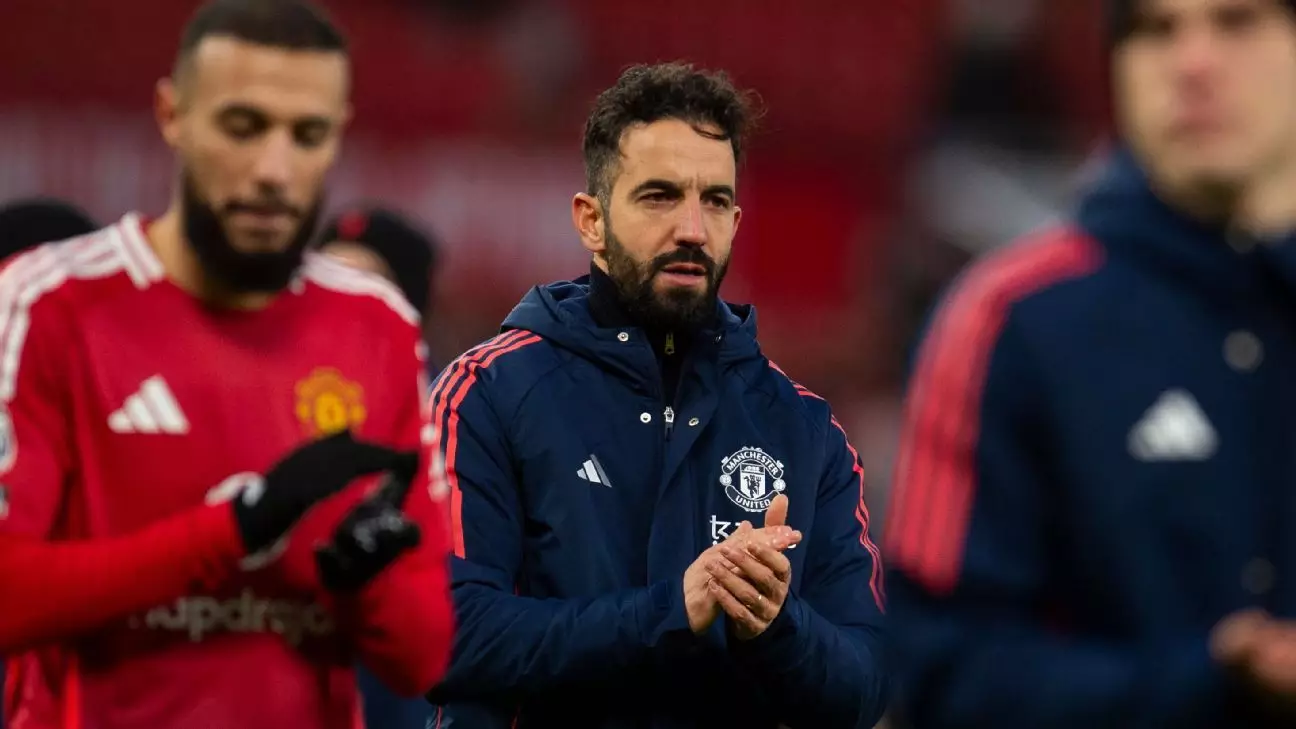Ruben Amorim’s tenure as the head coach of Manchester United finds itself shrouded in a dark cloud of discontent following a series of lackluster performances. When Amorim famously declared that “the storm will come,” it appears he was predicting the turbulent path awaiting him at Old Trafford. With this famous club suffering back-to-back Premier League defeats in a matter of weeks, it has become abundantly clear that challenges abound. The disappointment is palpable, not just among fans but also within the ranks of players who find themselves grappling with unexpected struggles.
After an impressive run during his time at Sporting CP, where he boasted a formidable home record, Amorim’s adjustment to the fierce competitive atmosphere of the Premier League has proved to be anything but seamless. The stark reality of losing at home—as demonstrated by a formidable 3-0 defeat to AFC Bournemouth—marks a significant departure from the stability he once knew. Reflecting on his experience, the atmosphere within the stadium was fraught with tension, as even the most hopeful supporters witnessed a lack of urgency and fighting spirit from their beloved team.
Amorim’s concerns are as multifaceted as they are urgent. From set pieces that lead to critical goals against his squad to missed opportunities that could have altered the course of matches, Manchester United’s performance has raised many eyebrows. Notably, their tendency to concede the first goal has now become an unfortunate trend, with six consecutive games starting with United on the back foot. Such scenarios significantly diminish the morale needed to mount effective comebacks, as seen in both the matches against Tottenham and Bournemouth.
The tactical hubris that once characterized Manchester United’s approach appears to have evaporated under pressure. In their latest bout with Bournemouth, a video replay of Ryan Christie’s headed assist prompted debates about officiating standards. Yet even in the face of questionable calls, Amorim’s team struggled defensively, an area of concern exacerbated by a series of errors from set pieces—a critique aimed at both the coach and his set-piece specialist, Carlos Fernandes. The numbers speak volumes: United has conceded 17 set-piece goals this calendar year, and this troubling statistic requires immediate attention.
Even though the defensive lapses have stolen headlines, what’s equally concerning is the club’s inability to convert chances created into goals. Despite strong performances punctuated by thrilling moments, such as generating opportunities against Tottenham and Bournemouth, the team has seen too many glaring misses. The spotlight fell heavily upon Bruno Fernandes, who squandered goal-scoring chances during crucial phases of the match against Bournemouth.
Such frustrations are exacerbated when other teams capitalize on their opponents’ inability to finish. Bournemouth, for instance, managed to score twice with breathtaking efficiency, exploiting key moments of collapse from United. Amorim’s post-match remarks hint at deeper issues. It’s not just about conceding but about the broader psychological impact these failures create within the squad, as they face dwindling confidence to respond positively when the game falters.
The ramifications stemming from these recent defeats extend beyond the immediate impact on league standings. With the festive period approaching, historically a critical juncture for clubs vying for European positions, United finds itself in uncharted territory, possibly entering the Christmas break in the lower half of the table—an alarming prospect for a club of its stature. Exiting the holiday season under such circumstances would symbolize an unexpected regression that no one at the club could have anticipated.
The storm Amorim referenced has manifested visibly both on the pitch and within the dugout, reflecting a lingering unease that hangs over daily operations at Old Trafford. Compounded by challenging upcoming fixtures against strong opponents, it is essential for Amorim and his team to reassess both strategy and mentality to navigate the stormy waters ahead.
As Manchester United plunges deeper into crisis management, heavier reliance on tactical adaptability and improving fundamental skills becomes a necessity. Reestablishing the winning mentality will not be an easy endeavour; the storm has arrived. Amorim finds himself in a singular position—one that promises both challenge and unprecedented opportunity.
To rebuild the foundation of a storied football institution, proactive measures must be embraced. The path to redemption lies in creating a cohesive, resilient unit capable of responding to adversity, whether that manifests through strategic awareness on the pitch or robust support from the stands. It’s time to face the storm head-on, or risk being swept away.

Leave a Reply